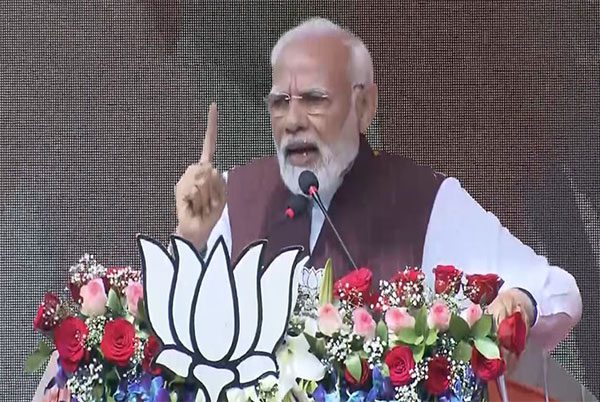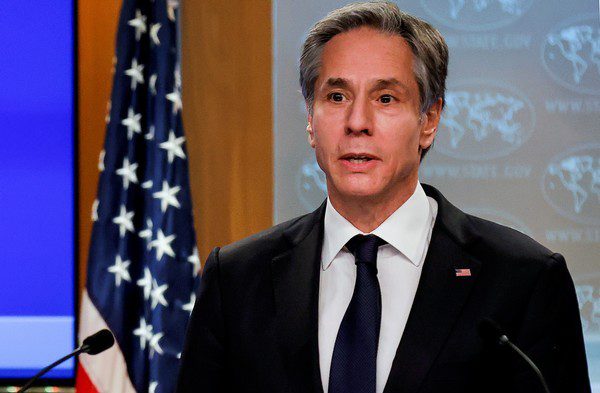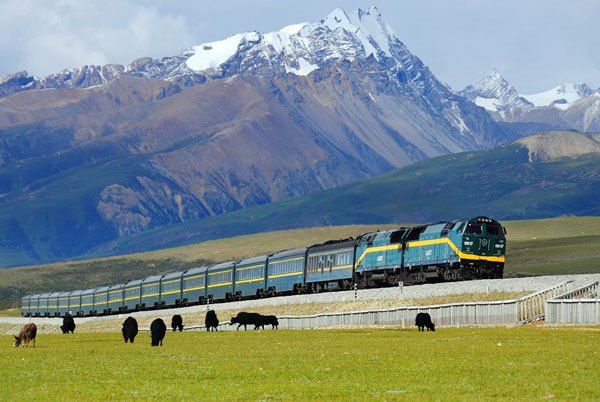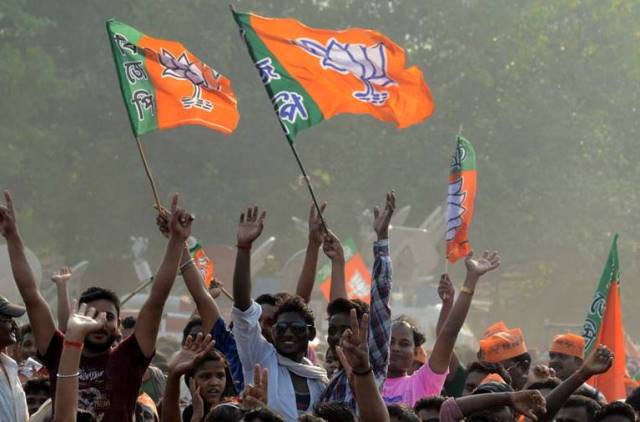After the results of assembly polls of three northeastern states were declared on Thursday, Prime Minister Narendra Modi said that the election results depict people’s faith in democracy, adding that the Northeast is neither far from Delhi nor from the heart.
Prime Minister Modi received a warm welcome at BJP headquarters in the national capital. PM urged the workers gathered at the occasion to turn on the flashlight of their phones in honour of the people of the northeast.
Addressing party workers at BJP headquarters, PM Modi said, “The Northeast is neither far from Delhi nor from our heart. The election results depict people’s faith in democracy. I humbly thank the people of Tripura, Nagaland and Meghalaya. These people have blessed the BJP and its allies. Besides, I congratulate the BJP workers of these three states. It is not easy to work in the northeast, and therefore a special thank is due to them.”
Today’s results, the PM said are the outcome of the hard work of all BJP workers. Today’s election and these election results have many messages for the country and for the world, he said.
In reference to earlier times, PM Modi said, “There was not much discussion in Delhi and other parts of the country when the results were out from the northeast region. The discussion was about the violence during the elections.”
The PM said winning the heart of the people of the northeast is a big win for him. He said the time has come for the northeast region’s peace, prosperity and development.
“By frequently visiting the northeast, I won their heart. And it is a big win for me. I was satisfied that the people of the northeast are no longer ignored. It is a time to create new history. When I visited the northeast recently, someone congratulated me on the half-century. When I inquired about it, I was told that I had visited the northeast 50 times,” he said.
The PM said BJP gave a new model of politics in India. For BJP, the country and the countrymen come first.
Many political analysts are trying to understand the reason for the victory of the BJP. Some of our well-wishers want to know the reason. The reason is ‘Triveni’. It means the combination of three streams. The first power is the work of the BJP governments, the second one is the work style of the BJP and the last one is the BJP work. The ‘triveni’ increases the power of the BJP by 1+1+1 = 111 times”
Earlier in Tripura, Prime Minister said there was a situation where even a flag of another party could not be hoisted. If someone tried to do it, he was made to bleed. “What a big change we have seen in these elections this time. Now we are seeing the Northeast moving in a new direction,” he said.
Prime Minister said BJP government is committed to the empowerment of women. Through various flagship schemes, he said the government ensured the empowerment of the women of the northeast.
After seven decades of independence, many villages of the northeast did not have electricity. Previous governments knew that it was a difficult task to electrify those villages, and therefore they turned a blind eye towards them, he stated.
Attacking the Congress party, PM Modi said, “Today’s results have exposed Congress’s thinking about the northeast. Congress claimed that these are small states and insignificant. It is an insult to the mandate and the people of the northeast states.”
“At such a time, some people are aspiring to dig Modi’s grave. But wherever there is a chance, the lotus keeps on blooming…It keeps on blooming. Some people are engaged in identifying fanatics…They also do dishonesty with fanaticism. These fanatics say – ‘Mar jaa Modi…mar jaa Modi…Desh keh raha hai mat jaa Modi,” Prime Minister added.
With the declaration of results for the Tripura Assembly polls on Thursday, Bharatiya Janata Party (BJP) returned to power in the state by winning an absolute majority.
According to the Election Commission of India, Bharatiya Janata Party (BJP) won 32 seats with a vote share of around 39 per cent. Tipra Motha Party came second by winning 13 seats. Communist Party of India (Marxist) got 11 seats while Congress bagged three seats. The Indigenous People’s Front of Tripura (IPFT) managed to open its account by winning one seat.
The CPI(M) and the Congress, arch rivals in Kerala, came together in the Northeast this time in a bid to oust the BJP from power. The combined vote share of CPI(M) and Congress remained around 33 per cent.
Chief Minister Manik Saha defeated Congress’ Asish Kumar Saha from the Town Bordowali seat by a margin of 1,257 votes. In the 60-member Tripura assembly, the majority mark is 31.
The BJP, which had never won a single seat in Tripura before 2018, stormed to power in the last election in alliance with IPFT and had ousted the Left Front which had been in power in the border state for 35 years since 1978.
The BJP contested on 55 seats and its ally, IPFT, on six seats. But both allies had fielded candidates in the Ampinagar constituency in the Gomati district.
The Left contested on 47 and Congress on 13 seats, respectively. Of the total 47 seats, the CPM contested 43 seats while the Forward Bloc, Communist Party of India (CPI) and Revolutionary Socialist Party (RSP) contested one seat each.
The CPI(M)-led Left Front ruled the state for nearly four decades, with a gap between 1988 and 1993, when the Congress was in power but now both parties joined hands with the intention to oust BJP from power.
In Nagaland, BJP secured 12 seats, Nationalist Democratic Progressive Party (NDPP) won 25 seats and Nationalist Congress Party (NCP) bagged seven seats. National People’s Party (NPP) won five seats. Naga Peoples Front, Lok Janshakti Party (Ram Vilas) and Republican Party of India (Athawale) won two seats each. Nitish Kumar’s Janata Dal (United) got one seat.
The majority mark in 60 seat Nagaland Assembly is 31.
In Meghalaya, the National People’s Party (NPP) won 26 seats, United Democratic Party (UDP) bagged 11 seats and Trinamool Congress got five seats. BJP, People’s Democratic Front and Hill State People’s Democratic Party bagged two seats each. Congress managed to get five seats while the Voice of the People Party got four seats. Two seats were won by independent candidates. (ANI)
Read More:https://lokmarg.com/









